Being of the AI Future: Reflecting on the Knowledge of the Self
“We study the past in order to free ourselves from it.”
(Yuval Hariri)
“The future’s already here; but, it’s just unevenly distributed.”
(Rose Luckin, Turing Lecturer)
And when conjoined, those freed from the past could work for an even distribution of the future.
As in the words of the UK Prime Minister after speaking with Elon Musk at the November 2023 AI Safety Summit;
“….to tip the balances in favour of humanity.”
OR ‘Every job that exists today won’t exist in exactly the same form in the future. The people who reskill themselves will have jobs, at this company or another, while those who don’t might not. That is simply part of the evolution of society.’
(Quote from a major employer in a position of power.)
Power – force in a velvet glove – was traditionally based on the ownership of land. This was followed by the ownership and control of the means of production.
Now and for the foreseeable future, power is and will be based on the ownership and control of data.
‘Artificial Intelligence’ is a term to describe machines which are being trained to process big data, to take decisions and learn in the process: intelligence without consciousness.
The Square is committed to a ‘daily advancement’ designed to futureproof masons in masonry through training, CPD and reskilling based on an understanding of where we are, how we got here and anticipating – as best as we can – the demands of the future. Thus, the central theme of this introductory piece is;
‘…those freed from the past could work for an even distribution of the future’.
The four industrial revolutions introduced a ‘tech-infusion’ impacting on all aspects of how humankind lives, moves and has its being.
They continue to radically alter the means of production, distribution and consumption of food, clothing, shelter and communication. However, the point is, industrial revolutions are as the name says – ‘revolutions’ which entail rapid and radical change.
It is entirely inappropriate to speak of ‘social evolution’.
In Freemasonry and Generative AI – Part 2 – The Square Magazine allusion is made to parallel universes of;
(i) Sapiens – nature, evolution; and
(ii) human – culture, revolution. Evolution and revolution are incommensurate.
Does nature have a say in evolution? Who or what – if anyone or anything – controls the course of culture in the form of industrial revolutions? Such activity entails risk-taking; the point is, who is taking the risk and who will bear any adverse, existential, consequences? Does civil society have a say: if not, says who?
‘Industrial Revolution’ describes a rapid, radical, technological application of scientific methodology to the processes of construction and manufacture. Rather than being in nature, logic/laws are the integrity of the equations employed to frame empirical observations and experimental data.
‘Science’, whatever that is, does not provide ‘truth’, whatever that is. Scientific methodology describes nature – the physical, measurable, universe – in terms of prediction and control.
Progress is measured by greater predictability which, through technology, is applied to the processes of construction and manufacture.
Chart to illustrate the paradigm of scientific methodology.
The Chart indicates inductive reasoning; ‘a’ is necessary and sufficient for ‘b’: it happened before; probably, it will happen again.
Industrial revolutions transform economic structures. The first and second industrial revolutions (1717 – 1983) required a mass labour force leading to some distribution of power. Is there a power to prevent those applying AI to industry from creating an economically surplus – powerless – class? Freemasonry is based on a celebration of the work ethic: building better.
From 1984, a third industrial revolution introduced CadCam, the working tools of computer-aided design and manufacture. It was trained to ensure that the design of components facilitated their automated manufacture.
This replaced trillions of blue-collar (manual) operations: the process continues. From 2016, a fourth industrial revolution, energised by artificial intelligence, is eliminating trillions of white-collar (managerial/professional) operations.
Fearing the application of AI would lever substantial job losses, the Writers Guild of America (WGA) withdrew its labour between May and October 2023.
IMAGE CREDIT: the square magazine digital collection Attribution 4.0 International (CC BY 4.0)
A return to work was enabled through a Memorandum of Agreement; Clause Five of which states:
‘We have established regulations for the use of artificial intelligence on a Minimum Basic Agreement (MBA) covered projects in the following ways:
• AI cannot write or rewrite literary material, and AI-generated material will not be considered source material under the MBA, meaning that AI-generated material can’t be used to undermine a writer’s credit or separated rights.
• A writer can choose to use AI when performing writing services, if the company consents and provided that the writer follows applicable company policies, but the company cannot require the writer to use AI software (e.g., ChatGPT) when performing writing services.
• The Company must disclose to the writer if any materials given to the writer have been generated by AI or incorporate AI-generated material.
• The WGA reserves the right to assert that exploitation of writers’ material to train AI is prohibited by MBA or other law.’
IMAGE CREDIT: the square magazine digital collection Attribution 4.0 International (CC BY 4.0)
In December 2023, Microsoft agreed with the American Federation of Labor and Congress of Industrial Organizations (AFL-CIO) union federation that it will remain neutral in efforts made by unions to encourage workers to become members.
The two sides will also work together on the future impact of artificial intelligence in the workplace.
The agreement provides high-level commitment and clarity on how the Company will work with the AFL-CIO and its affiliates for its employees and those of suppliers who wish to pursue the formation of a union. Made up of 60 unions representing about 12.5 million workers, the AFL-CIO is the largest federation of unions in the United States.
Source: Microsoft News
English Freemasonry had a seminal role in the development and influence of civil society: it spread over continents.
In November 2023, King Charles III of the United Kingdom said,
‘The risks of artificial intelligence need to be tackled with a sense of urgency, unity and collective strength.’
Does ‘collective strength’ include a role for civil society?
The personal and economic costs of the WGA strike remain to be calculated; the sustainability of the ‘Minimum Basic Agreement’ remains to be seen. Given its prevalence within the creative arts, it would be interesting to know how many Freemasons were among the strikers.
The WGA is a unit of civil society; what if around the world, other manifestations of civil society had conjoined in strike action? At the November 2023 UK AI Safety Summit, one of the organisers praised the role of civil society groups as being;
‘…able to confront companies directly about their failings in a way governments would be reluctant to’.
Perhaps civil society also has a role in confronting failing governments?
Perhaps it is time for Freemasonry – a prime mover in the generation of the civil society curve – then retreated behind it – to step up again and be structural within ‘collective strength’.
As a part of civil society, it could conjoin global thinking and serve within local communities by raising digital awareness and mitigating digital deprivation.
IMAGE Credit: the square magazine digital collection Attribution 4.0 International (CC BY 4.0)
Orwellian connotations notwithstanding; it was not so much 1984 ‘Newspeak’ but rather, 2016 and the Large Language Model. Could ‘AIspeak’ supersede human language by way of:
• Amplification of bias;
• disinformation;
• insidious influence;
• explicit intimacy; and,
• seduction.
In which case, whither the knowledge of the self? Perhaps ‘knowledge of the self’ could now be better understood as identity: the question is, self and/or group identity?
Whilst the application of AI has the potential to mitigate many of humankind’s problems, what challenges (existential?) to humankind might be generated in the process? Does reskilling entail a revised knowledge (invention?) of the self.
The ordering of masonic degrees requires acceptance of the Liberal Science’s Quadrivium of scientific methodology and an understanding of the Liberal Art’s Trivium of grammar, rhetoric and logic before studying the knowledge of the self.
If cultural experience is based on feelings. the knowledge of the self could be understood as persons superimposing language on their feelings.
Perhaps there is no logic in human experience but only in the grammar of the language by which it is described.
My world is my language and the limits of my world are the limits of my language.
(Ludwig Wittgenstein)
The government of the people, for the people, by the people can be understood as ‘the people’ conversing in human language, on a level playing field, for the purpose of making decisions.
If the Long Language Model begins to disrupt or displace human language, whither the government of the people? Hence the need for enhanced CAPTCHA (Completely Automated Public Turing Test to tell Computers and Humans Apart) to individuate the sorcerer from the apprentice.
IMAGE CREDIT: the square magazine digital collection Attribution 4.0 International (CC BY 4.0)
The Sorcerer’s Apprentice Paradigm describes a process whereby an apprentice eliminates a blue-collar operation. However, the process extends beyond the apprentice’s control and threatens the inundation of the environment. (Does that sound familiar?)
The sorcerer returns and restores order: was the apprentice signed up for CPD or needed reskilling? Might the Fourth Industrial Revolution be already, beyond the control of the sorcerer (big-tech companies) and beyond the control of AI Safety Summits and the catch-up of subsequent regulation (jurisdictions)?
‘If computers are not made like humans, computers will make humans like them.’
(Kristian Hammond)
Some theologies are portrayed as redemptive journey to salvation – collateral damage notwithstanding. Similar language has been, and is, employed by those promoting and managing industrial revolutions.
Freemasonry is promoted as a journey of daily advancement. Today’s challenge is to design a change management which embeds within cultures, the ramifications of AIs development and application.
A ‘redemptive journey of daily advancement’ could be understood as Continuous Professional Development (CPD).
CPD delivers tactical processes; especially for facilitating regulatory compliance. However, perhaps the most useful role for CPD would be to identify a need for and trigger strategic, mandatory, pre-emptive, reskilling.
IMAGE CREDIT: the square magazine digital collection Attribution 4.0 International (CC BY 4.0)
Which on this ‘ceiling’ is the sorcerer and which the apprentice: does it depict CPD or Reskilling? (Quote: ‘I am not a person.’ ChatGPT 3.5)
• A knowledge of the self might require knowing which is the sorcerer and which the apprentice?
• For a knowledge of the self, would a Grand Architect of the Metaverse be needed?
• If there is control, how might the Fourth Industrial Revolution be change-managed for equity?
• Assuming there is any, who or what will control reskilling?
• How will people, both those in power and those not in power, ‘reskill themselves’?
• Does re-skilling entail transforming the knowledge of the self?
Perhaps the metaverse is indeed for those who are free of the past or in the process of so becoming.
Are Freemasons, wishing to be freed from the past, prepared to make a futuristic paradigm shift? Freemasonries have a commitment to service.
What form might it take: is there a choice between active agency and tacit recipience?
IMAGE CREDIT: the square magazine digital collection Attribution 4.0 International (CC BY 4.0)
When formed in 2015, the OpenAI stated;
“Our aim is to build value for everyone rather than shareholders….to advance digital intelligence in the way that is most likely to benefit humanity as a whole … unconstrained by a need to generate financial return”
This has been termed ‘effective altruism’: how might this, effectively, be accommodated within Fourth Industrial Revolution structure? Might ‘identity crisis’ indicate something of the recent volatility around OpenAI’s Board?
Perhaps academia is ‘…able to confront companies directly about their failings in a way governments would be reluctant to’ and also, confront failing governments?
Who and what will ensure companies and governments listen to and act on extra-jurisdictional matters.

Dr Steve Cave, Director of the Cambridge University Institute for Technology and Humanity.
IMAGE LINKED: Cambridge University Institute for Technology and Humanity Attribution 4.0 International (CC BY 4.0)
In November 2023, Cambridge University announced an Institute for Technology and Humanity. It seeks to better enable a research-level understanding of the associated benefits and risks posed by the development and application of AI.
“There is nothing inevitable about either the triumph or disaster they cause, we need to proactively chart a course for more desirable futures.”
Dr Steve Cave, Director of the Cambridge University Institute for Technology and Humanity.
‘There is nothing inevitable…’? Random, volition: are there deterministic power structures? Could civil society have influence on the asymmetrical power structures of decision-making and achieve a more effective partnership with governments’ and companies:
How might civil society universal be more impactful to ensure:
(i) Maximising and evenly distributing AIs benefits. “To tip the balances in favour of humanity.”
(ii) That given this is an ‘intelligent’ industrial revolution, reskilling should already be in place to ensure any adverse impact/consequences are pre-calculated, and pre-compensated.
(iii) Human fulfilment for economically surplus people.
(iv) Controlling the secure and safe implementation of AI frontier models by learning how machines learn.
(v) Consensual ownership and control of data.
(vi) As the implementation of AI is not within the gift of an individual nation-state or commercial undertaking, the high level of trust evident within civil society is utilised in the design of pan-jurisdictional strategies for raising digital awareness and the elimination of digital deprivation in localities.
Is this a unique opportunity for Freemasonry Universal within civil society? Realisation will require:
(i) Policy: deciding to do something.
(ii) Procedure: organisation, management and administration to produce a form, fit for the functionality of (i).
(iii) Practice: on-goingly evaluating (ii) to check if it is delivering (i) and if not, what it is delivering and what, if any, on-course correction is needed.
A knowledge of the self is achieved by recognising a difference between rhetoric and logic – an understanding of how language is applied in decision-making.
What an opportunity for Freemasonry to make a difference by promoting a knowledge of the self – an identity – which is fit for the future.
Article by: Gerald Reilly

Gerald Reilly was initiated in 1995 into St Osyth's Priory Lodge 2063. Essex. England (UGLE).
He was a founder member of Josh Heller's Allthingsmasonic, and with Josh co-wrote 'The Temple that Never Sleeps' (Cornerstone Books, 2006) he is committed to the development of e-Freemasonry.
Awarded the Norman B Spencer Prize, 2016.
Book: by Gerald Reilly

The Temple That Never Sleeps
by Josh Heller and Gerald Reilly
Freemasons and E-Masonry Toward a New Paradigm
A revolutionary book for every Freemason.The two authors, American and UK Masons, present a radical view of Freemasonry for both today and tomorrow.
In addition to their ideas are those of numerous Internet Masons (E-Masons) from around the world who, by sharing the experience of their own Masonic journey, have provided stunning personal insight into the viability of the Craft in the Internet Age.
This book will challenge your understanding of Freemasonry today and how it might transform for future generations.
Recent Articles: by Gerald Reilly
 How can the allegory of the Tower of Babel teach us tolerance? Language can be a divide. Not confusion among languages but rather within language, a seriously unclear understanding of another’s world-view. We assume it is so different from our own and yet with clarity, a realisation there is more which unites than separates. |
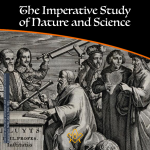 The Imperative Study of Nature and Science At some stage during Freemasonry's Second Degree, the candidate is advised that there is now permitted, something like, the extension of their research into the hidden mysteries of nature and science. Such is an excellent permission and one that each and every Freemason should pursue with awe and passion. |
 Pure Ancient Masonry; P4. A Companion in Rule, Building a better world P4. A Companion in Rule, Building a better world - The four parts of Pure Antient Masonry comprise the ‘body’ Masonic; they are the building blocks of the vital relevance, through enhanced citizenship, wherein the soul of Freemasonry abides. |
 Pure Ancient Masonry; P3. The Master, Building Better Character Part 3: The Master, Building Better Character - Being raised is a transition from knowledge to wisdom. |
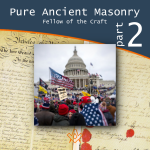 Pure Ancient Masonry; P2. A Fellow of the Craft Part 2: A Fellow of the Craft, Building Better Knowledge. Pure Antient Masonry consists of four parts. ‘Building the Temple’ is the fundamental Masonic allegory for building better people; this must be understood as a seamless whole: |
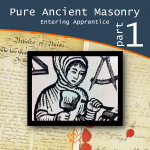 Pure Ancient Masonry; P1. An Entering Apprentice Part 1. An entering apprentice: Building Better Communities; Pure Antient Masonry consists of four parts. ‘Building the Temple’ is the fundamental Masonic allegory for building better people to build a better world |
 Pure Ancient Masonry; Intrduction This series will consider the defining characteristics, lessons and benefits of Three Degrees, the Order of the Royal Arch and when conjoined, Pure Ancient Masonry. |
 The Christianising of British Freemasonries - P4 This concluding article in the series considers the separation of British freemasonries from the Grand Orient of France (GOdF) and maintaining fraternity with the Prussian Grand Lodge of the Three Globes. |
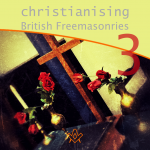 The Christianising of British Freemasonries - P3 Discover the battle for the 'soul' of Masonry. Part 3. French Perdition: ‘…for what fellowship hath righteousness with unrighteousness’? |
 The Royal Arch – ‘the fourth step in regular Freemasonry’ United Grand Lodge of England, has now designated the Royal Arch, the fourth step in regular Freemasonry, it therefore must be concluded that…publications…should now be revised, and based on attracting to the benefits of the four steps. |
 The Christianising of British Freemasonries - P2 How might the battle for the souls of Freemasonries be identified in a way that ensures thriving in the 21st Century? There is no guarantee of the immortality of the soul of Freemasonry! ‘We study the past in order to free ourselves from it.’ (Hariri) |
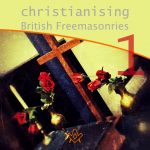 The Christianising of British Freemasonries - P1 This four-part series considers: 1. the separation of British Freemasonries from the Grand Orient of France (GOdF); and, 2. maintaining fraternity with the Prussian Grand Lodge of the Three Globes. |
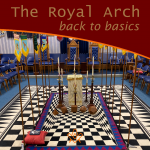 The Royal Arch - Back to Basics In the Royal Arch ceremony, the sojourners are buried with their tools in a vault. The sun, at its highest, provides enlightenment and the principal sojourner is returned to the former companions of his toil |
 The Holy Land and the Holy Sites P4 Fourth instalment of the four-part series, considers ‘masonic’ aspiration and activity regarding the Holy Land and The Holy Sites |
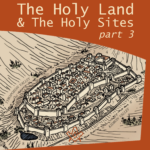 The Holy Land and The Holy Sites P3 Third instalment of the four-part series, considers ‘masonic’ aspiration and activity regarding the Holy Land and The Holy Sites |
 The Holy Land and The Holy Sites P2 The four-part series will consider ‘masonic’ aspiration and activity regarding the Holy Land and The Holy Sites |
 The Holy Land and The Holy Sites P1 In this four-part series, we will consider ‘masonic’ aspiration and activity regarding the Holy Land and The Holy Sites |
 Science and Citizenship: Towards a 21st Century Masonic Mindset. |
 Towards a 21st Century Masonic Mindset: Part 3 ‘Freemasonries’ and the Fourth Industrial Revolution |
 Towards a 21st Century Masonic Mindset: Part 2: ‘Freemasonries’ and Religiosity. |
 Towards a 21st Century Masonic Mindset: Part 1: ‘Freemasonries’ and Governance. |
Articles by Others: VR/AR/AI metaverse freemasonry
 The Great Algorithm of the Universe Explore the algorithmic essence of the Universe, from complex to simple and back again. Dive into the stochasticity of nature, the organic and inorganic omniverse, and the unexpected excellence of algorithmic data. Discover how repetitive processes yield extraordinary exceptions, much like the historic publication of the freemason’s constitutions. |
 Building a 21st Century Freemasonry Legacy: Freemasonry, rooted in the Middle Ages, values knowledge, equality, and fraternity. This article examines its historical influence on science and peace and its potential to continue this role. Understanding Freemasonry's relationship with science and peace is crucial for contributing to a fair, peaceful, and multipolar contemporary world. |
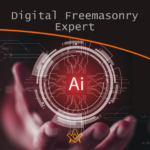 In the ever-evolving world of technology, artificial intelligence (AI) has revolutionized various industries, and now it's making its mark on Freemasonry. The Official Digital Freemasonry Community (ODFC) has introduced the "Digital Freemasonry Expert" AI tool, which aims to provide Masonic members with quick and accurate access to information, historical facts, and answers to their burning questions. This groundbreaking tool not only enhances the Masonic experience but also encourages dialogue and a deeper understanding of Masonic heritage. Join ODFC in embracing the digital transformation of Freemasonry and paving the way for innovation. |
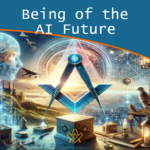 Being of the AI Future: Reflecting on the Knowledge of the Self Being of the AI Future; critically examines the shift from traditional power dynamics to data control in the AI era. It challenges us to rethink evolution and self-identity amidst AI's rise, highlighting Freemasonry's role and the need to balance technological progress with preserving human values. |
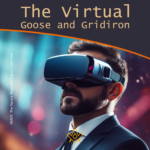 The Virtual Goose and Gridiron In a digital era where virtual reality blurs the lines between the tangible and the intangible, Masonry explores the metaverse. Here, a Masonic Hall stands grand in the virtual expanse, its public symbols beckoning seekers and brethren alike. Within, curated materials and private chambers offer knowledge and connection, transcending physical limits. |
 Freemasonry and Generative AI – Part 2 Freemasonry meets Generative AI: Dive into the profound intersection of ancient Masonic principles and cutting-edge artificial intelligence. Explore the ethical conundrums, ontological debates, and the evolving role of AI in Masonic traditions. Will Brother AI soon join the Masonic ranks? A must-read for tech enthusiasts and Freemasons alike. |
 The article explores using Virtual Reality (VR) for Masonic rituals, offering immersive experiences beyond traditional methods. While VR ensures consistent quality and flexibility, it might reduce group interactions. The author suggests Masonic bodies consider VR for specific rituals, highlighting its future potential. |
 Venturing into the Virtual Lodge: A Revolutionary Approach to Freemasonry Unlock the celestial secrets of Freemasonry! Discover how Masonic rituals transcend physical boundaries, reaching for the stars in a VR space. Join us on a cosmic journey, where ancient traditions meet cutting-edge technology under the watchful eye of the comet above. The future of Freemasonry is here! |
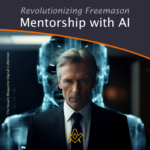 Revolutionizing Freemason Mentorship with AI Explore the intricate relationship between Freemasonry and mentorship in this captivating article. Unearth the rich history of this secretive fraternity, the symbol-laden rituals, and the transformative power of mentorship within the brotherhood. Delve into challenges faced and the potential impact of AI on Freemasonry mentorship. Immerse yourself in this intriguing journey! |
 The Future Use of Virtual Reality for Freemasonry Ritual Experience Freemasonry like never before! Dive into our ground-breaking research on harnessing Virtual Reality (VR) for Freemasonry rituals. We're transforming centuries-old traditions into immersive, accessible experiences. Discover how we're bridging the gap between historical symbolism and cutting-edge technology. Join us on this exciting journey into the future of Freemasonry! |
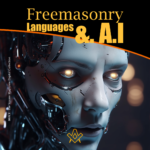 Unlock the enigmatic world of Freemasonry as we delve into its secret language. Explore the fascinating intersection of Generative AI and the Turin Test, unravelling the hidden codes and symbols that have intrigued generations. Discover the mysteries behind this ancient craft in our captivating introductory article. |
 Discover the exciting intersection of Freemasonry and AI. Explore how programming personal AI robots with Masonic principles like brotherly love, relief, and truth can revolutionize our interaction with technology, fostering a more ethical and empathetic AI future. Dive into the world of the Freemason AI robots now! |
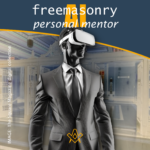 Imagine you are an AI-based personal development coach. Describe a subscription service that leverages cutting-edge technology and behavioural science to help users achieve their personal growth goals. What features would it have, and how would it keep subscribers engaged month after month? |
 Artificial Intelligence and its uses: from Society to Freemasonry Just as AI is not a panacea or a disaster, and the result depends on its use, so its application in Masonry will be beneficial and not counterproductive if the Brothers apply it constructively. By George Thanasoulas |
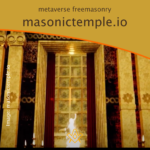 Metaverse freemasonry takes one step closer to become a reality as the Portuguese based company, Skyunicron, show case their Solomon Temple in the metaverse platform, a place for all Freemasons to meet in brotherly love and harmony, which at all times characterises freemasonry. Lets take a short tour….. |
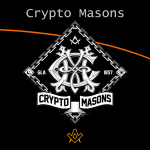 One of the first initiative for Masonic Art NFT collections with philanthropic goals supported by a regular Grand Lodge, in this case, the Great Lodge of Argentina of Free and Accepted Masons. |
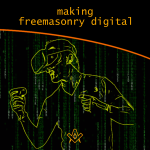 How do we prepare to make Freemasonry digital? Once we strip away the Masonic packaging, we are left with pure Freemasonry, which is not physical but content. |
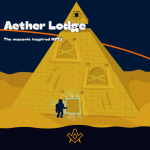 The vision is to satirize the many existing myths and preconceptions about Freemasonry by building a united community around an engaging story with multiple benefits. Aether Lodge consists of 9990 Masonic-themed NFTs divided into multiple collections. |
 What connects Freemasonry and Bitcoin ? Both are misunderstood and ridiculed by the ill-informed. If freemasonry is about being a better citizen of the world. Then Bitcoin is about: making the world a better place for all citizens |
 Metaverses, Masonry and Minecraft: The Future of Lodges Should Freemasons be proud that a clandestine group has borrowed their symbolism and ideology and transplanted it into a server known as ‘The Worst Place in Minecraft’? Metaverses, Masonry and Minecraft: The Future of Lodges |
 Freemasonry and the Metaverse P2 In this second instalment, Freemasonry and the Metaverse. We discusses the importance of being an open source protocol and how could Freemasonry benefit from a metaverse structure? |
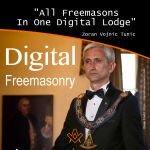 All Freemasons In One Digital Lodge; Is this viable?, is it practical ?, is it even possible ? To answer this question we need to under the problem "Digital Freemasonry" aims to fix. |
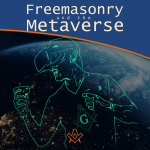 Freemasonry and the Metaverse P1 There is growing interest in the Freemasonry and the Metaverse on social media. Some projects are starting out as Masonic art NFT collections, while others are more clearly see a point in the future where they will be lodges operating in a metaverse. |
 Great Architect of the Metaverse Are you ready to meet in the metaverse ? what can you expect to see and do ? |
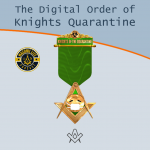 The Digital Order of Knights Quarantine Called “The Digital Order of Knights Quarantine”, it was advertised as “not-a-degree” because it was not an actual degree. |
 What would make a good Masonic phone app? Share one feature you would include in a phone app for Freemasons . . . |
masonic knowledge
to be a better citizen of the world
share the square with two brothers

click image to open email app on mobile device













